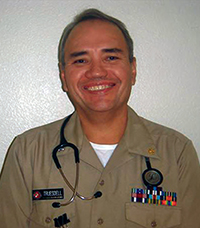 Why did you choose your specific health professional career?
Why did you choose your specific health professional career?
I chose my field of work in order to serve Native American communities. I knew I had the interest and ability to serve as a physician. After rotating through several Indian Health Service (IHS) hospitals and clinics, I found that family medicine was an area of high need. Throughout IHS, primary care is still needed in both rural and urban settings.
Describe any obstacles or barriers to success that you encountered along your health professional career path. How did you overcome them?
The biggest obstacle was money. I didn’t have enough money to help support my family and to go to school. It was very difficult to work and go to school at the same time. When my mother lost her job, I had to start working full time as a nursing assistant at the Maricopa County Hospital Psychiatric Annex. I would work the night shift from 11:00 P.M. to 7:00 A.M. and go to school during the day. I did poorly that semester and had to retake some of the courses, but I kept at it.
What do you do in your current job?
I am a family doctor in a 638 bed tribal hospital at the service unit in Tuba City, AZ. I do full spectrum family medicine except obstetrics. I work in both major areas of medicine; inpatient medicine which means in the hospital wards, and outpatient medicine which involves ambulatory clinic care.
What advice do you have for American Indian/Alaska Native students who are interested in health careers?
Do not give up on your goals. Work hard and stay focused. If you are having problems or obstacles, the best thing you can do for yourself is fall back and regroup, but do not quit.
Do you practice traditional medicine? If you do, then how does traditional medicine interact with conventional medicine?
I do not practice traditional medicine; however, if a patient wants a medicine man or a ceremony, I encourage it, as long as it does not substantially delay care or harm the patient.

